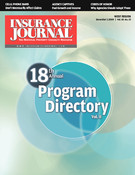While cell phone use increases the risk for vehicle accidents, research has not yet verified that banning such devices improves driving performance, according to the Insurance Institute for Highway Safety (IIHS).
The Arlington, Va.-based Institute recently testified before a joint hearing of the House Subcommittee on Commerce, Trade, and Consumer Protection and the Subcommittee on Communications, Technology, and the Internet on cell phone laws and driving.
The cumulative evidence from various studies points toward cell phone use as a risk factor for crashes and impaired driving performance. “There are discrepancies among studies as to the magnitude of the increased risk, but there is little doubt that this is a traffic safety problem,” IIHS testified. Yet while studies have reached different estimates of the magnitude of the risk, well-controlled research that verified phone use in large samples of crash-involved drivers found that the risk of crashing was four times higher when a driver was talking on either a hand-held or hands-free phone.
Seven states and the District of Columbia have banned hand-held cell phone use while driving, but the effects of these laws on hand-held use is mixed. Moreover, the effect on safety isn’t clear. Many drivers still use hand-held phones where use is banned, and other drivers may switch to hands-free devices, which does not help, because the crash risk with either type of device is about the same. Preliminary data from insurance claims for collision suggest no apparent reduction in crash risk after states enacted hand-held bans, IIHS said.
“Laws limiting the use of all electronic communications devices by drivers may make the most sense based on the research, but such laws are difficult to enforce. Police officers can see whether a driver is holding a phone to the ear, but it is much harder to determine if a driver is sending a text message or talking on a hands-free phone,” IIHS said.
While analyses of insurance claims are preliminary, when IIHS examined rates of insurance claims in states with hand-held bans, there was no notable change in the collision claim rate associated with a hand-held ban.
“The most serious deficit in our knowledge is that we do not know whether banning driver phone use reduces crash frequency,” IIHS said. “Before we encourage or require more states to enact bans, researchers should examine the effects of existing bans and whether they enhance traffic safety.”
For information, visit www.iihs.org/.
Topics Personal Auto
Was this article valuable?
Here are more articles you may enjoy.


 Former Ole Miss Standout Player Convicted in $194M Medicare, CHAMPVA Fraud
Former Ole Miss Standout Player Convicted in $194M Medicare, CHAMPVA Fraud  The $3 Trillion AI Data Center Build-Out Becomes All-Consuming for Debt Markets
The $3 Trillion AI Data Center Build-Out Becomes All-Consuming for Debt Markets  Lawyer for Prominent Texas Law Firm Among Victims ID’d in Maine Plane Crash
Lawyer for Prominent Texas Law Firm Among Victims ID’d in Maine Plane Crash  Florida Senate President Says No Major Insurance Changes This Year
Florida Senate President Says No Major Insurance Changes This Year 


